新目标英语八年级上册Unit1导学案
八年级英语上册导学案-Unit 1 Where did you go on vacation

Unit 1 Where did you go on vacation? 导学案Section A 1a—2c第1课时【学习目标】:1. Talk about past events2. To learn to use where questions and answers【学习重点】:学会用一般过去时态描述曾经度过的假日。
【学习过程】:1. 知识链接:1). 复习一般过去时态的意义与结构。
2). 掌握一些规则的和不规则动词的过去式。
2. 自主学习(教师寄语:Many hands make light work. )1) 要求学生小组讨论自己刚刚过去的暑假。
并写下用到的句型:____________________________________________________________________________ ____________________________________________________________________________ _______________________________2) 利用素材练习以上句型。
3)认读短语并将单词与图画匹配.4)小组活动Example: A: Where did Tina go on vacation?B: She went to the mountains.3. 听力练习1)Listen. Where did the people go on vacation? Complete the chart.People PlacesGraceKevinJulie2)Listen again. Check(√)Yes, I did or (×)No, I didn't for each question.4. 巩固练习According to the listening, and role-play the conversations between Grace, Kevin and Julie.Example: A: Grace, where did you go on vacation?B: I went to New York City.A: Oh, really? Did you go with anyone?B: Yes, I went with my mother.课后作业Show us your vacation. Whose vacation is the best(最棒)?【学习小结】(教师寄语:No man can do two things at once.)1. 总结一下本课时学到的动词短语。
人教八年级上册英语Unit1导学案
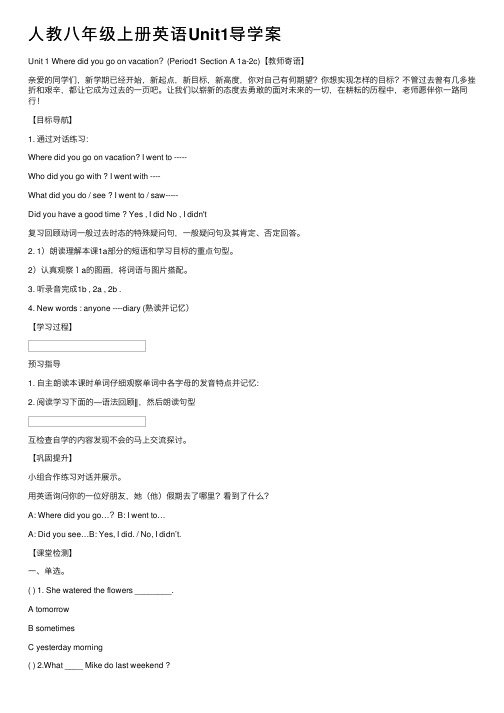
⼈教⼋年级上册英语Unit1导学案Unit 1 Where did you go on vacation?(Period1 Section A 1a-2c)【教师寄语】亲爱的同学们,新学期已经开始,新起点,新⽬标,新⾼度,你对⾃⼰有何期望?你想实现怎样的⽬标?不管过去曾有⼏多挫折和艰⾟,都让它成为过去的⼀页吧。
让我们以崭新的态度去勇敢的⾯对未来的⼀切,在耕耘的历程中,⽼师愿伴你⼀路同⾏!【⽬标导航】1. 通过对话练习:Where did you go on vacation? I went to -----Who did you go with ? I went with ----What did you do / see ? I went to / saw-----Did you have a good time ? Yes , I did No , I didn't复习回顾动词⼀般过去时态的特殊疑问句,⼀般疑问句及其肯定、否定回答。
2. 1)朗读理解本课1a部分的短语和学习⽬标的重点句型。
2)认真观察1a的图画,将词语与图⽚搭配。
3. 听录⾳完成1b , 2a , 2b .4. New words : anyone ----diary (熟读并记忆)【学习过程】预习指导1. ⾃主朗读本课时单词仔细观察单词中各字母的发⾳特点并记忆:2. 阅读学习下⾯的―语法回顾‖,然后朗读句型互检查⾃学的内容发现不会的马上交流探讨。
【巩固提升】⼩组合作练习对话并展⽰。
⽤英语询问你的⼀位好朋友,她(他)假期去了哪⾥?看到了什么?A: Where did you go…?B: I went to…A: Did you see…B: Yes, I did. / No, I didn’t.【课堂检测】⼀、单选。
( ) 1. She watered the flowers ________.A tomorrowB sometimesC yesterday morning( ) 2.What ____ Mike do last weekend ?A doB doesC did( ) 3. I often help my mother _____ housework.A doesB didC do( ) 4. _____ you _____ TV last night ?A Do, watchB Did, watchC Did, watched( ) 5.They _____ on a trip in February ,2007.A are goingB goingC went( ) 6.----Good afternoon, Miss Lee. How does Mike feel?-----He’s tired . He ____ a lot of work ______ .A does , this morningB do , this morningC did , this moring⼆、适当形式填空。
人教新目标英语八年级上册unit1 period 4 writing 作文导学案
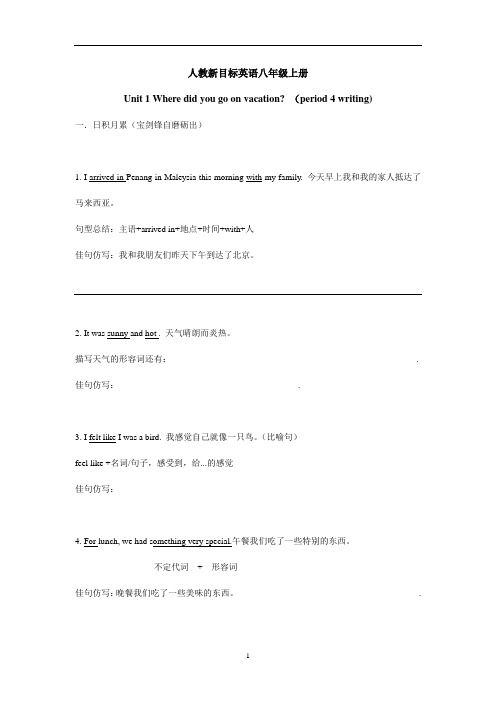
人教新目标英语八年级上册Unit 1 Where did you go on vacation? (period 4 writing)一.日积月累(宝剑锋自磨砺出)1.I arrived in Penang in Maleysia this morning with my family. 今天早上我和我的家人抵达了马来西亚。
句型总结:主语+arrived in+地点+时间+with+人佳句仿写:我和我朋友们昨天下午到达了北京。
2.It was sunny and hot . 天气晴朗而炎热。
描写天气的形容词还有:________________________________________________________. 佳句仿写:_________________________________________.3.I felt like I was a bird. 我感觉自己就像一只鸟。
(比喻句)feel like +名词/句子,感受到,给...的感觉佳句仿写:________________________________________________________4.For lunch, we had something very special.午餐我们吃了一些特别的东西。
不定代词+ 形容词佳句仿写:晚餐我们吃了一些美味的东西。
__________________________________________.5.I like this place because I learned something important. 我喜欢这个地方因为我学到了一些重要的东西。
不定代词+ 形容词佳句仿写:我喜欢这本书因为我看到一些有趣的东西。
___________________________________________________.二.厚积薄发:列提纲(自己完成额!)1.Where:2.Who:3.How/weather4.What /do5.What/food6.How/ feel三.小试牛刀:Write a travel diary by using your notes above. 利用上面的提纲写一篇旅行日记。
新目标英语八年级上册Unit1教案
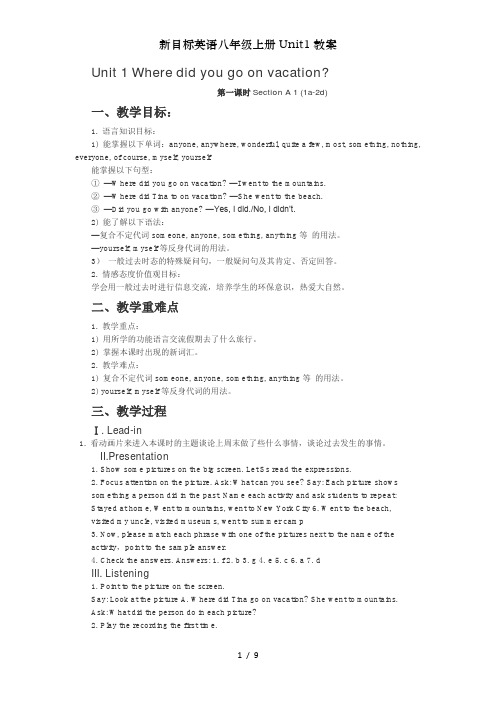
Unit 1 Where did you go on vacation?第一课时Section A 1 (1a-2d)一、教学目标:1. 语言知识目标:1) 能掌握以下单词:anyone, anywhere, wonderful, quite a few, most, something, nothing, everyone, of course, myself, yourself能掌握以下句型:①—Where did you go on vacation? —I went to the mountains.②—Where did Tina to on vacation? —She went to the beach.③—Did you go with anyone? —Yes, I did./No, I didn’t.2) 能了解以下语法:—复合不定代词someone, anyone, something, anything等的用法。
—yourself, myself等反身代词的用法。
3)一般过去时态的特殊疑问句,一般疑问句及其肯定、否定回答。
2. 情感态度价值观目标:学会用一般过去时进行信息交流,培养学生的环保意识,热爱大自然。
二、教学重难点1. 教学重点:1) 用所学的功能语言交流假期去了什么旅行。
2) 掌握本课时出现的新词汇。
2. 教学难点:1) 复合不定代词someone, anyone, something, anything等的用法。
2) yourself, myself等反身代词的用法。
三、教学过程Ⅰ. Lead-in1. 看动画片来进入本课时的主题谈论上周末做了些什么事情,谈论过去发生的事情。
II.Presentation1. Show some pictures on the big screen. Let Ss read the expressions.2. Focus attention on the picture. Ask: What can you see? Say: Each picture showssomething a person did in the past. Name each activity and ask students to repeat:Stayed at home, Went to mountains, went to New York City 6. Went to the beach,visited my uncle, visited museums, went to summer camp3. Now, please match each phrase with one of the pictures next to the name of theactivity,point to the sample answer.4. Check the answers. Answers: 1. f 2. b 3. g 4. e5. c6. a7. dIII. Listening1. Point to the picture on the screen.Say: Look at the picture A. Where did Tina go on vacation? She went to mountains.Ask: What did the person do in each picture?2. Play the recording the first time.3. Play the recording a second time.Say: There are three conversations. The people talk about what did on vacation. Listen to the recording and write numbers of the names in the right boxes of the picture.4. Check the answers.IV.Pair work1. Point out the sample conversation. Ask two Ss to read the conversation to the class.2. Now work with a partner. Make your own conversation about the people in the picture.3. Ss work in pairs. As they talk, move around the classroom and give any help they need.4. Let some pairs act out their conversations.V. Listening1. Tell Ss they will hear a conversation about three students’ conversations. Listen for the first time and fill in the chart. Then listen again and check Yes, or No.2. Let Ss read the phrases in the chart of 2b.3. Play the recording the first time. Ss listen and fill in the chart.4. Play the recording a second time for the Ss to check “Yes, I did.” or “No, I didn’t. ”5. Check the answers with the Ss.VI. Pair work1. Let two Ss read the conversation between Grace, Kevin and Julie.2. Let Ss work in pairs and try to role-play the conversation.3. Ask some pairs to act out their conversations.VII. Role-play1. First let Ss read the conversation and match the people and places they went.2. Let Ss act out the conversations in pairs.3. Some explanations in 2d.Homework:用英语询问你的一位好朋友,她(他)假期去了哪里?看到了什么?并将此对话写在作业上。
(完整版)新人教版新目标英语八年级上册优秀公开课教案全册导学案教学设计
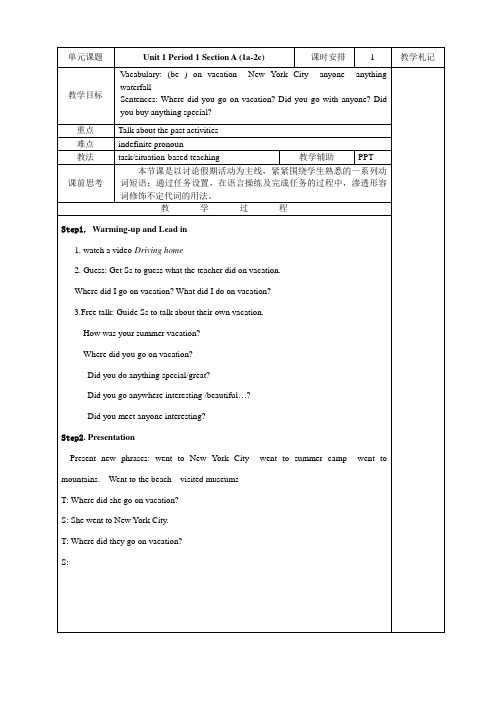
语法归纳Unit 4教学札记形容词的比较级和最高级(二)1. 形容词的比较级和最高级的用法(1)形容词比较级用于两者(人或物)之间的比较,表示一方比另一方“更……”或“较……”,后面通常用比较连词than连接另一方所比较的人或物。
than引导的是比较状语从句,但为了避免重复,从句中有些与主句相同的部分常常省略,而把相比较的部分省略出来。
另外,在上下文明确时,形容词比较级也可以单独使用。
例如:This room is smaller than that one (is). 这个房间比那个房间小。
He is younger than I(am). 他年纪比我小。
His English is better than his brother 's (is). 他的英语比他哥哥的好。
1.形容词最高级用于三者或三者以上的人或事物之间的比较,表示其中一方在三者以上的人或事物中“最……”。
最高级前通常用定冠词the, 并用of或in短语来说明比较的范围。
Of后面一般接表示同类的名词,in接表示范围的名词。
例如:He is the tallest of all. 他是所有人中最高的。
Li Hua is the best student in his class. 李华是他班上最好的学生。
2.比较级与最高级的区别与联系(1)比较级是用来把彼此独立的适合人进行比较;最高级是把一个群体中的一员与整体进行比较,这个群体必须包括这个成员,请看下面例句:(A)Mary is taller than her two sisters. 玛丽比她的两个姐姐高。
(B)Mary is the tallest of the girls. 玛丽是这些女孩中最高的。
【注意】句(A)中玛丽是在另外两个姐妹之外,是玛丽一个人同另外两姐妹(作为一方)来比较,所以用比较级。
句(B)中玛丽是这些女孩之一,所以用最高级。
(2)比较级可以用来表示最高级的含义。
人教版新目标 初二英语 八年级上册Unit1 单元教案
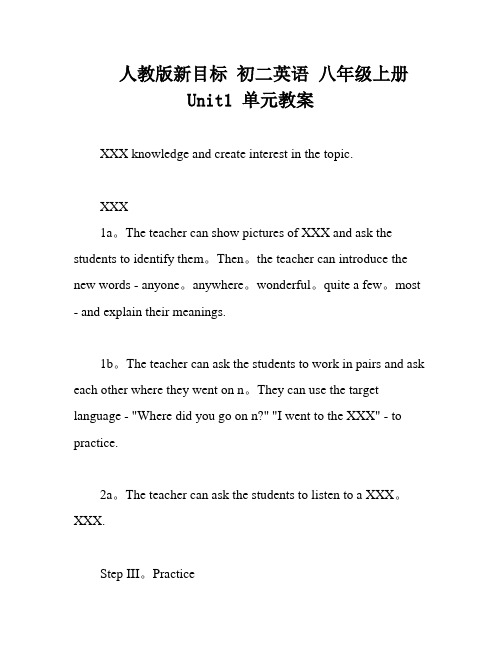
人教版新目标初二英语八年级上册Unit1 单元教案XXX knowledge and create interest in the topic.XXX1a。
The teacher can show pictures of XXX and ask the students to identify them。
Then。
the teacher can introduce the new words - anyone。
anywhere。
wonderful。
quite a few。
most - and explain their meanings.1b。
The teacher can ask the students to work in pairs and ask each other where they went on n。
They can use the target language - "Where did you go on n?" "I went to the XXX" - to practice.2a。
The teacher can ask the students to listen to a XXX。
XXX.Step III。
PracticeXXX can ask the students to work in groups and share their own n experiences using the target language and new words they have learned。
The teacher can also encourage them to ask follow-up XXX.Step IV。
nXXX can ask the students to write a short paragraph about their favorite n using the target language and new words。
八年级英语导学案Unit1Lesson1 What’s the weather like
Lesson1 What’s the weather like ?学(学习目标)【学习目标】1. 掌握的词汇:rather storm rise (rose \risen) set2. 识别的词汇及短语:thunder sunrise sunset能力目标:能灵活运用所学词汇和句型描述各种天气情感目标:learn to make a weather report教学重点:重点短语和句型What’s the weather like ?It will be …/It is …What’s the temperature?教学难点: to make a weather report测(基础知识)1读课文,勾画出文中的重难点和疑难点,准备与同学共同探讨(1.)a weather report _____________(2.)degrees ________________ (3.)clouds__________ (4.)rather__________ (5.)shower_________ (6 )a thunder storm_________2 Read the text again and find out some useful expressions:on the radio_______________ (2)go down____________(3)come up__________________(4)相当凉爽___________________(5)我不希望如此________________(6)听我说_____________________(7)a good weather reporter_______________ (8)a weather report____________3. Read the text again and find out the meaning of the sentences: (小组展示)Is it going to rain today, Danny?_______________________________There will be some showers this afternoon._______________________________________Tell us what time it will rise and set!(4) It is ten degrees ____________________________(5) I hope not ____________________(6) )I am scared of thunder.________________________教(重难点)单词和词语探究snow课文原句:It’s not snowing. (2)There is some snow on the grass. (3)It will be snowy.思考:snow 有几种词性?______________________________________________Scared 课文原句:I’m scared of thunder!思考:你能写出同义句吗?________________________________________be scared/afraid to do sth 意为“害怕做某事”be scared/afraid that 后接句子rather课文原句:It’s rather cool today, isn’t it? 这是个反义疑问句,由两部分组成,中间用逗号隔开。
最新人教新目标八年级上册英语Unit 1 Where did you go on vacation全单元导学案
第1单元Where did you go on vacation?Section A 单词anyone pron.任何人anywhere adv.在任何地方wonderful adj.精彩的;绝妙的few adj.&pron.不多;很少most adj.,adv.&pron.最多;大多数something pron.某事;某物nothing pron.没有什么;没有一件东西everyone pron.每人;人人;所有人myself pron.我自己;我本人yourself pron.你自己;您自己hen n.母鸡pig n.猪seem v.好像;似乎;看来bored adj.厌倦的;烦闷的someone pron.某人diary n.日记;记事簿短语go on vacation去度假anything special什么特别的stay at home待在家里have a good time玩得开心quite a few相当多;不少of course当然;自然句型1.—Did you go out with anyone? 你和别人一起出去的吗?—No. No one was here. Everyone was on vacation.不。
没有人在这里。
大家都去度假了。
2.—How was the food? 食物怎么样?—Everything tasted really good! 每样东西尝起来都很美味!Section B 单词activity n.活动enjoyable adj.有乐趣的;令人愉快的decide v.决定;选定try v.& n.尝试;设法;努力bird n.鸟bicycle n.自行车;脚踏车building n.建筑物;房子trader n.商人wonder v.想知道;琢磨difference n.差别;差异top n.顶部;表面wait v.等待;等候umbrella n.伞;雨伞wet adj.湿的;潮湿的;下雨的duck n.鸭below prep.&adv.在……下面;到……下面hungry adj.饥饿的as adv.像……一样;如同conj.当……时;如同hill n.小山;山丘dislike v.&n.不喜爱(的事物);厌恶(的事物)enough adj.&adv.足够的(地);充足的(地);充分的(地)短语feel like给……的感觉;感受到because of因为arrive in到达 a lot of许多;大量的take some photos拍一些照片too many太多句型1.There are a lot of new buildings now, but many of the old buildings are still there. 现在那里有许多新的建筑物,但是许多老式的建筑物还在那里。
英语八年级上人教新课标同步导学案:unit1
新课程背景下教改学案年级:八科目:英语内容:Unit 1 How often do you exercise? 第一课时主备:校正:八年级英语组执教:八年级英语教师审核:预习内容:八年级新目标英语上册P1 Section A 1a-1c学习目标:1.掌握下列单词和句子。
单词: how often, exercise, skateboard , hardly, ever句子:What does she do on weekends ? She often goes to the movies.2.一般现在时和频率副词的用法重点难点: P1的生词和频率副词的位置。
Ⅰ.自主预习学案1.阅读教材: 1)认真预习单词 P99(5个)2)认真预习教材 P1 Section A 1a-1c并作好笔记。
2. 预习自测.必做题 A. 新的学期开始了,亲爱的同学请回忆一下我们七年级学过的一般现在时的用法。
完成下面的任务。
任务(一)1.当谓语动词为be动词时,其句型:主语+ be(am / / )+其它。
2.当谓语动词为实义动词/行为动词充当时,其句型:主语+(/ V-s / V- es )+ 其它。
3.标志性时间状语:always/ / / /等。
4.be动词特殊疑问句:特殊疑问词+ be(/is / are)+()+其它+?5.行为动词特殊疑问句:特殊疑问词+do/does +主语+()+其它+?我们一起来复习动词的第三人称单数形式的变化规则:1)一般情况,在动词词尾加s;2)以字母s, x, ch, sh, o结尾的动词,加es;3)以e结尾的动词,加s;4)以辅音字母加y结尾的动词,变y为i,再加es 5)以元音字母加y结尾的动词,加s;6)特殊:hav e→has are →is任务(二) 写出下列动词的第三人称单数1.drink2.play3.stay4.make5.pass6.brush7.watch8. go9.do 10.study 11.fly 12.have任务(三) 改写句子1. Tim is a good boy.→(否定句)→(一般疑问句)→(肯定回答)→(否定回答)2. Tom does his homework at home.→(否定句)→(一般疑问句)→(划线提问)必做题 B. 认真预习教材 P1,汉英互译。
新目标英语 八年级上册 unit1 Section B导学案
万州环球教育初一升初二英语课程八年级unit1 Section B课堂用资料Name_____________ 2013.7.14
1.引入:Did you have breakfast?
What did you have for breakfast?
2.看图片,完成1a
3.仿造1b灵活编对话,注意下列知识点
want (sb)to do sth
She says (that) it is good for my health.
health / healthy
4.听完成2a & 2b
注意how many hours…?
5.仿造2c编对话
6.阅读3a
(1). 听,勾画出生词及短语
(2). 读课文,回答课文后的问题
(3). 理解文章大意
(4). 重要知识点:
pretty
eating habits
try to do sth
a lot of
of course
I sleep nine hours every night.
look after
help
be the same as yours
7.阅读3b
(1).完成3b空格
(2).自读感知文章大意
(3).重要知识点
I think (that) I am kind of unhealthy.
maybe
although
8.仿造练习4互相询问朋友的生活习惯,健康否?
9.口头作文
How to keep good habits?。
- 1、下载文档前请自行甄别文档内容的完整性,平台不提供额外的编辑、内容补充、找答案等附加服务。
- 2、"仅部分预览"的文档,不可在线预览部分如存在完整性等问题,可反馈申请退款(可完整预览的文档不适用该条件!)。
- 3、如文档侵犯您的权益,请联系客服反馈,我们会尽快为您处理(人工客服工作时间:9:00-18:30)。
新目标英语八年级上册Unit1导学案第一课时学习目标:1、掌握Page1-2页的单词和短语。
2、通过学习了解不同的活动类型,掌握常见的频度副词和表示频率的常用短语。
3、通过合作探究,熟练掌握和运用下列重点句型:What do you usually do on weekends? I usually go to the movies.What does he usually do on weekends? He usually does his homework.How often do you watch TV? I always watch TV.How often does she watch? She watches TV once a week.4、全力以赴,高效学习,在合作探究中培养团队协作精神。
学习重点:1、本节课应掌握的生词和短语。
2、了解不同的活动,掌握和运用常见的频度副词及表频率的常用短语。
3、熟练掌握和运用学习目标中所要求的重点句型。
学习难点:1、how often 句型、频度副词和表频率的短语的运用。
2、运用所学知识进行综合运用。
能力立意:1、通过听力训练培养学生从听力中获取细节信息的能力。
2、通过对话练习,培养学生的口头表达能力。
预习导学:1、自学Page1-2页的单词。
(根据音标拼读、拼写单词并牢记)。
2、自学完成Section A 1a。
3、标出重要的短语和句型,标出疑难点,准备课堂中讨论解决。
课堂小结(2)自学检测:( A.B. C层必做)根据句意或首字母提示填空:1. do you watch TV? Sometimes.2.Do you like e (运动)?Yes, It's good for my health.3.I often s in the sea ,it's very exciting.4.He swims in the river.“It's very dangerous.” he says.5.What your favorite p ? It's talk show.6.How often does Li Hai surf the Internet? T a week.翻译下列短语和句子多久一次上网几乎不在周末看电影看电视每天一周一次一月两次一年四次每两周三次你多久看一次电视?他从来不去看电影。
合作探究:1、组内讨论解决自学检测中的疑难问题。
2、根据课件提示操练学习目标中的重点句型并进行课堂展示。
3、知识点探究:●本节课所学习的用于表示频度的6个副词是:.根据其含义,这几个频度副词所表示的频率由强至弱依为: .●观察下列表示频率的短语:once a week three tines a week twice every two weeks five times a week……我们可以看出这些表频率的短语的结构是由加构成。
●How often do you watch TV?I often watch TV. How often does she go shopping? She goes shopping once a week.观察上面的句子,我们可以归纳得出:对句中表示频度的副词或短语提问,应使用疑词 .听力检测听录音完成并检查答案。
课内检测单项选择:1. do you shopping? Twice a week?(A.B.C层必做)A. How longB.How muchC.How oftenD. How many2.Please give me the glasses ,I can see the words on the blackboard.( A.B层必做)A.hardlyB.reallyC.ratherD. clearly3.My mother often goes shopping weekends. (A.B.C层必做)A.atB.forC.inD.on4.Xiao Ming exercises , so he is unhealthy. (A.B层必做)A.alwaysB.oftenuallyD.hardly ever5.The student late for class.A.is oftenB.often isC.be neverD.never be(A.B.层必做)句型变化:1.He often exercises. (变同义句)( A.层必做)He often .2.I do my homework every day . (对划线部分提问)( A.B. C层必做)do you do your homework?3.Lily surfs the Internet three times a week.(对划线部分提问)(A.B.C层必做)does Lily the Internet?4.We go to the park twice a month. (变同义句)( A.B层必做)We go to the park a month.课堂小结第2课时Unit 1 编号:N0.2班级姓名小组________组内评价教师评价学习内容:Section A 2c-4.学习目标:1、掌握page3的单词和短语。
2、自学理解part 3短文并能复述。
3、通过2c、语法及part 4的学习,继续巩固和运用下列重点句型:How often do you watch TV? I always watch TV.How often does she watch? She watches TV once a week.4、全力以赴,高效学习,在合作探究中培养团队协作精神。
学习重点:1、本节课应掌握的生词和短语。
2、短文的阅读理解。
3、继续熟练掌握和运用学习目标中所要求的重点句型。
学习难点:短文阅读理解与复述。
能力立意:1、学生阅读理解能力的培养。
2、通过对话练习,培养学生的口头表达能力。
预习导学1、自学Page3的单词。
(根据音标拼读、拼写单词并牢记)。
2、自学完成Section A 2c . 3 .4 三个部分的表格内容,为课堂展示作准备。
3、标出重要的短语和句型,标出疑难点,准备课堂中讨论解决。
根据句意或首字母提示填空:1.Can you tell me the r of your math test?2.A f my English, it's not good.3.How long did you stay there? A two days.4.Please be a (积极的)in each English class.翻译下列短语:至于高中动物世界全体学生一周三至四次绝大多数学生大约两周一次没有学生合作探究:1、组内讨论解决自学检测中的疑难问题。
2.组内就2c及part 4内容进行对话练习,并在全班展示。
3、组内合作探究part 3,理解all. most.some.no所表示的程度含义,复述短文。
课内检测1.Here are the results the student activity survey.(A.B.C层必做)A. atB.atC.ofD. as2. students can answer the problum ,it's too dificult( A.B.C层必做)A.AllB.MostC.SomeD. No3. my English,I don't worry it.(A.B.C层必做)A.As ifB.such asC.as forD.As in4.Xiao Ming exercises once twice every day. (A.B.C层必做)A.orB.toC.andD.to5.Here some drink for you. (A.B.层必做)A.isB.areC.beD.not (A.B.层必做)6.What is the time? It's 2:00 O 'clock.A.forB.atC. aboutD.of (A.B.层必做)7.No students the results.A. knowB.knowsC.knewD.knowing (A.层必做)句型变化:1.All students went to the beach last weekend. (变同义句)( A.层必做)the students went to the beach last weekend .2.I eat junk food once or twice a week. (对划线部分提问)( A.B. C层必做)do you eat junk food?3.She doesn't know about the person at all. (变同义句)( A.层必做)the person, She doesn't know about at all.课堂小结第3课时学习内容:Section B 1a-2c.学习目标:1、掌握page4的单词和短语。
2、巩固和运用How often句型。
3、认真、求实、专注、高效。
学习重点:本节课应掌握的生词和短语。
巩固和运用How often句型。
学习难点:听力训练及How often句型的综合运用。
能力立意:1、通过听力训练培养学生从听力中获取细节信息的能力。
2、通过对话练习,培养学生的口头表达能力。
预习导学1、自学Page4的单词。
(根据音标拼读、拼写单词并牢记)。
2、课前自行完成1a.3、标出重要的短语和句型,标出疑难点,准备课堂中讨论解决。
一、自学检测:(A.B. C层必做)根据句意或首字母提示填空:1.I don't like j f , it's not good for my h .2.She ' s thirsty ,she wants to d some c and m .3.Some i v isited our school last week.4.How students are there in your class? Fifty.翻译下列短语:多少垃圾食品喝牛奶喝咖啡对…有益合作探究:1.组内讨论解决自学检测中的疑难问题。
2.根据1b及2c内容仿例进行对话练习,并在全班展示。
3.组内合作探究be good for be good at be good to 的区别。
听力训练课内检测1. apples do you want? (A.B.C层必做)A.How manyB.How muchC.How oftenD.How far2.We should be good the old .(A.B层必做)A.atB.toC.forD.of3.He is good at . (A.B.C层必做)A.swimB.swimsC.swimmingD.swam4.Don't eat junk food,it's not good your heath. (A.B.C层必做)A.atB.toC.forD.of根据汉语对话练习:((A.B.C层必做)A:非常感谢你接受采访。
